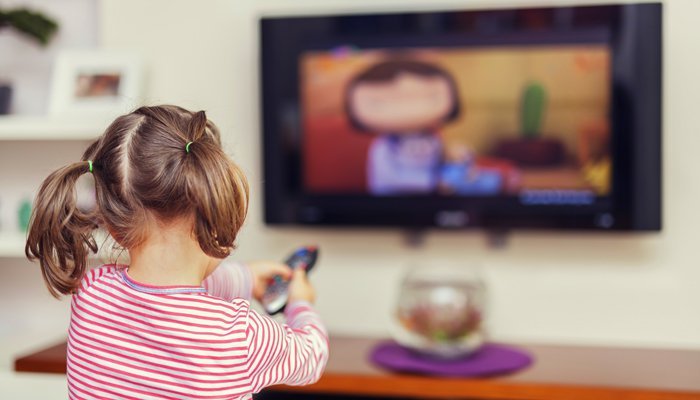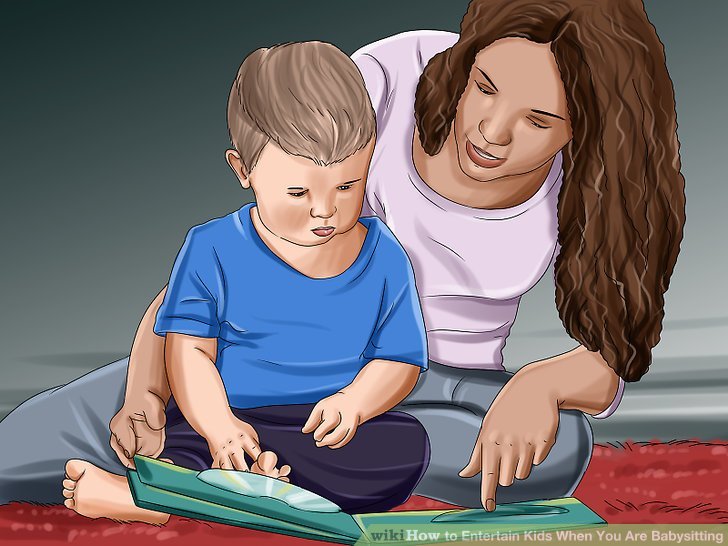There’s a reason television is called the ultimate babysitter. Here’s why you shouldn’t treat it that way. With the proliferation of so many educational shows and easy access to kiddie cable channels, more and more parents think that it’s okay to let their kids watch and learn from television. Not so, according to the American Academy of Pediatrics (AAP).

The early years are vital to a child’s development, and studies have yet to prove the absolute positive effects of television on infants and toddlers. However, researches on the benefits of parents and child interactions are already proven.
But if you really cannot avoid putting your child in front of the television, you desperately need to distract her for a few minutes while you finish on your household chore—there are some guidelines on TV watching:
Set time limits.
Treat TV time like giving your child sweets—in moderation. He can enjoy some to a certain extent. The AAP advocates that kids should watch no more than one or two hours of TV a day, but children under two should not be allowed to watch at all. Break TV time into 15—minute segments. More than that, your toddler’s brain may go on autopilot.
Be strict.
Keep TV viewing under control from day one as it is easier to change rules later than to have a two-year old throw tantrums because he started watching one-hour shows three times a day. Set rules like “No TV at meal times”; never put a TV in your child’s bedroom. If your child is to be left with a yaya, give specific instructions with regards to TV time.
Carefully select programs.
Always preview shows before letting your child watch them. Choose slow-paced educational programs that young minds can easily absorb and digest. Avoid scary and violent shows that may affect your child’s behavior. Let her watch simple interactive programs that will motivate your child to repeat words and sounds, or to sing and dance. Ask yourself, “Are the characters of the show reflecting the values I want my child to emulate?” Trust your instincts and come up with your own list of ‘’certified child friendly’’ shows.
Provide transition time.
Inform your child that a show is about to end two to five minutes ahead to help him anticipate the next activity.
Give alternatives.
Keep books, toys and other non-screen entertainment on hand inside the TV room, or suggest outdoor activities to entire your child to do other things than having his eyes glued to the tube.
Watch with your child.
Never let the TV baby-sit. Parents who leave children to watch shows alone send a signal that they don’t care what they are watching. Consider doing tasks like sewing or folding clothes beside your child instead. Encourage him to ask question as you explain what’s going on in the show.

Opt for taped programs, if possible.
Buy or rent DVD’s instead of letting your child watch television station or even ‘’kid-friendly’’ cable channels to avoid the temptation of advertising. Young kids exposed to marketing messages are not yet able to process commercials especially when their favorite characters are the one used to promote the products. If it cannot be helped, educate your child on the purpose of advertising by asking question like ‘’do you really think you need that products? What do you think will happen if we don’t buy it?’’ to help them put the idea of buying certain things into perspective.
Check program schedules ahead of time.
If you have no DVD player, make sure you know what time your child’s show turn on the TV during that time. Find other show listings that the whole family can watch with your toddler-those will help reinforce good values and are developmentally appropriate well as nonviolent.
Follow up on concepts learned.
If your child has just finished watching a show that teaches the alphabet, find a book or think of an activity that will reinforce learning.
**Be a good example. **
It is easier to teach a child that it is not good to watch television all the time if parents will walk the talk. Limit your own TV viewing time especially when your child is still awake.


There are tons to do with kids--read to them, have them play with water, have a picnic with them, cook with them, etc. The possibilities are endless! You just have to be creative and resourceful. All the while, you not only save electricity, you also ensure the development of a strong with your child.
Thank you for reading my post :) Till next time Lablab! <3
Image Source: Google.com


PHILIPPINES: 19th of March, 2018. Monday. ParentingPost #6
WARNING - The message you received from @alexadropedro is a CONFIRMED SCAM! DO NOT FOLLOW the instruction in the memo! For more information, read this post: https://steemit.com/steemit/@arcange/phishing-site-reported-sleemit-com
Ay hindi ginagamit banner ng TNS haha sorry na nakalimutan ko ilagay Laguna haha
@resteemator is a new bot casting votes for its followers. Follow @resteemator and vote this comment to increase your chance to be voted in the future!